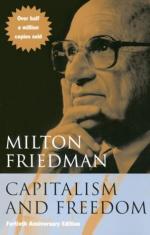
|
Liberalism
The 17th, 18th, and 19th century ideology that emphasized representative government, the rule of law, free enterprise, free trade, the advancement of women, constitutionalism, ending slavery, limitations on state power and the freedoms of speech, religion and the press.
Capitalism
The economic system that arises in combination with modern industrial institutions and strong private property rights with little government interference.
Keynesianism
The economic doctrine of government intervention.
Socialism
The social and economic philosophy that holds that the means of production should be owned by the state.
Paternalism
The social and political philosophy that holds that some individuals must have decisions made for them by the state because they are unable to take care of themselves.
The Great Depression
The period of deep economic recession worldwide between 1929 and 1941.
Floating Exchange Rates
An arrangement of international money supplies that allows currency values of different countries to change given the...
(read more Object Descriptions)
|
This section contains 322 words (approx. 2 pages at 300 words per page) |

|




